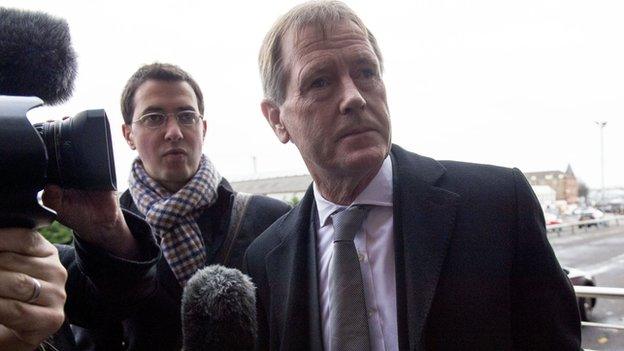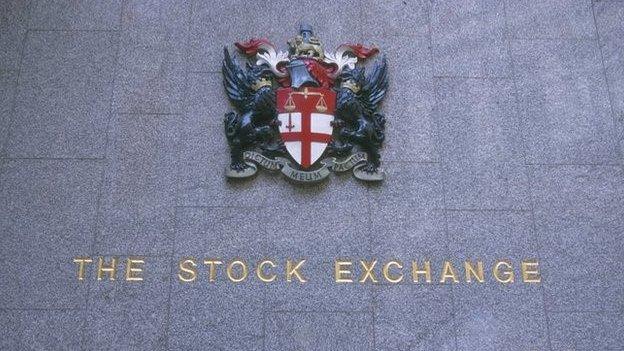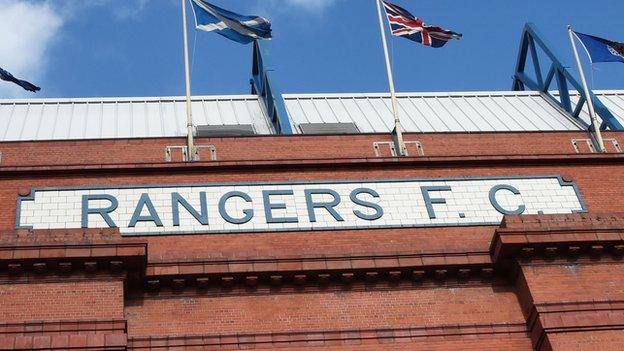Rangers SNAFU, part 376
- Published

It will come as no surprise to followers of events at Ibrox that it's back to code SNAFU - that is, the situation is normal, in that it's all, er, fouled up.
Thirty days ago, the nominated adviser for the holding company, Rangers International Football Club (RIFC), resigned. Trading on the stock exchange was suspended. The company was given 30 days to find a new one.
To recap further, a nominated adviser, or nomad, is required by the London Stock Exchange to carry out first-line regulation of a company that's listed on the Alternative Investments Market (AIM) - the junior trading platform for shares in smaller, younger companies and higher risk investors.
The nomad has to make sure that the company's governance is in line with stock market rules. The nomad's reputation depends on it.
So if the regulated company's governance is a burach, there's blood all over the boardroom walls, complaints are piling in, the auditor quits, accountants warn that there's significant risk that the company may not be able to continue as a going concern, and it's doubtful that the football team can win promotion to a higher-earning league... and so it goes on... then any sane nomad would be wise to take his camel and stay well clear.
And that's precisely what's happened.

Dave King is staying off the board until approved by the football authorities and the stock exchange
We're told by the new bosses at Ibrox that the first test by a prospective (unnamed) nomad was passed. That was the "fit and proper" test for the directors who took over the club two days after the last nomad quit.
And that test was also applied to Dave King, whose South African convictions for tax criminality on a grand scale have cast rather a large shadow over his plans to become the Ibrox chairman.
He's staying off the board until approved by the football authorities and the stock exchange - except it looks like the stock exchange test won't be a problem any more.
Match-maker
So what are the implications of delisting.
Quite a few Rangers fans own small shareholdings following the stock market float in December 2012. It's now much more difficult to sell those shares, though if you can find a buyer, there's nothing to stop you selling. Registering the sale should still be possible.
A stock market is the place where buyers and sellers can meet up and do their deals. If there's not much liquidity - that is, it's hard to find a buyer - then the value of the asset goes down.
That helps explain why we're hearing that legal action is being contemplated by those who invested in RIFC, and feel let down.
They could have expected the AIM listing provided assurance that the company would be competently run. There's now evidence that it wasn't.
And the value of shares has fallen from 93p to 17p, then rebounding to 35p when trading was suspended.

To help shareholders, the directors of RIFC are putting in place a temporary solution. They've found a broker who can match-make for buyers and sellers. That system is used by Millwall FC shareholders.
The next bit of the plan is to join another market.
In a previous incarnation (cue familiar protests from those who don't believe in corporate reincarnation as the same football club), Rangers Football Club shares were traded on the Plus exchange. That was before Craig Whyte came along.
Plus is now known as ISDX. Arsenal FC shares are traded there (rather better footballing company than Millwall). It's one of two potential trading platforms. The Ibrox statement says both are keen to see RIFC admitted for trading.
That may be true. But it's hard to forget that, 28 days ago, Dave King was offering assurances that he had a nomad lined up and everything would be tickety-boo.
And ISDX also requires a nominated adviser to work with listed companies and ensure they're sticking to the rules. It's known as an ISDX corporate adviser.
Will they also baulk at Rangers' toxic legacy or its chairman-elect's business record in South Africa?
Out of sight
The next challenge is getting new investment. Listing on the main stock exchanges adds not just liquidity but also credibility to a company's share offerings.
The new directors made clear earlier this week that they want to raise more funds this summer from shareholders, plus new investors. They need to, simply to pay the bills.
Being off the Alternative Investment Market means lower costs of compliance and less management time taken up in keeping shareholders informed.
But being turfed off is likely to carry a penalty when the company goes fundraising. It's less regulated, so it's probably worth less.
The wording of the delisting statement hints that that won't be a problem. Investment is already being lined up with people who aren't bothered about the lack of a listing. That suggests that the small-scale fan investor won't be a feature.
It also suggests that the key deal-making is going to be done out of sight of fans, the public and the media. And that's worked really well for Rangers in the past, hasn't it?
- Attribution
- Published2 April 2015
